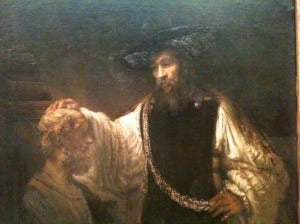Degrees of fiction
Earlier this week, I read on Clare O’Farrell’s blog a post (called 'Foucault: truth, language and philosophy') which talked about ‘degrees of fiction,’ and I’ve pilfered the phrase as the title of my new blog.
I’ve always been interested in stories, their effect, function and relationship to the real world, ever since I discovered as an unhappy 11 year old, separated from my parents and at boarding school, that a story could be both a consolation and a lifebuoy.
Then, as a young teacher, I soon realized that a story could both settle a difficult class and be a teaching tool.
In my Masters thesis, written during a period in my professional life when I was a psychotherapist, I argued that story can ‘transform the leaden sense of fruitless struggle’, and my PhD was about the ways in which the sharing of stories links both teller and listener to desired and animating worlds.
A central idea, through all of this, has been John Holt’s suggesting that the imagination is more a reaching out towards reality, rather than an attempt to escape from it.
Clare’s post explores this connection between words and phrases and their relationship with truth or reality. She writes:
We are always faced with degrees of fiction: human culture, language and thought are fabrications from the very outset.
I’m imagining that I’ll be using this blog to continue my exploration of these ‘fabrications’.
As I write this, I'm suddenly reminded of a painting I saw recently. It's by Rembrandt, and shows the philosopher Aristotle deep in thought as he rests his hand on a bust of Homer, the story-teller, the inventor of fabrications. I like to imagine that Aristotle's deep thoughts are born out of his respect for, or love of, the mythopoetic.






